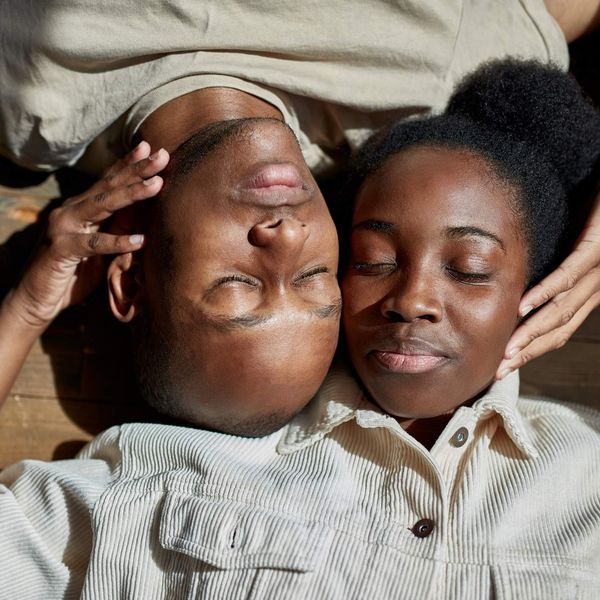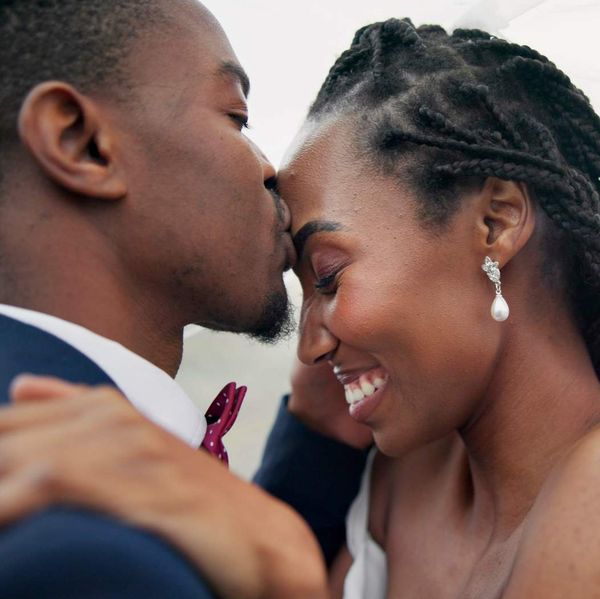Getting engaged is a really special time in a couple's life. Hmph. Let me tell it, a lot of folks miss out on just how beautiful that season can be because they are so busy "acting married" before the proposal (meaning, they put marriage expectations on each other without being married yet), then they are rushing to get down the altar once it happens. According to many marriage therapists and counselors, it's a good idea to wait between nine months to a year to officially say "I do" (over two years oftentimes means that somebody isn't really ready yet). To a large extent, I would agree. That's because the season of engagement isn't just about planning a wedding; it's also when two people shift from seriously dating to being intentional about becoming husband and wife. That requires a different kind of focus and energy.
A couple of years ago, I wrote "The 'Pre-Commitment Interview' Every Dating Couple Should Have" for any two people who are considering going from casual dating to something more exclusive. In some ways, this is an extension of that. If this feels like the year that you and your boo thang are ready to take your relationship to another level, please be certain that you are both on the same page when it comes to the following seven issues. The future of your marriage—and sanity—will depend on it.
1. Knowing Why You Both Want to Get Married
Something that I find really interesting is when, say a company does some racist BS to someone and the person demands a public apology. Once the story gets enough press, oftentimes the company will relent (more like concede). Then that same person will shop in that same store again. What in the world? The only reason the company apologized was that, while they still don't like our blackness, what they do appreciate is our green. The "sorry" is insincere. They need to feel it where it hurts—their pockets.
I might step on some toes with this, but I'd rather help people to not prematurely get engaged than end up in divorce court a couple of years later. Take a deep breath, now. About half of the married men (some of which are divorced now) who I know told me that while they were dating, an ultimatum was given by their girlfriend. A literal, "If you don't propose, I'm outta here." I know folks like to romanticize ultimatums 'n all but, to me, they are nothing more than a threat. Marry me or else? Why would you want a man who feels like he has to be forced to choose you?
That's why, when it comes to the things that are important for a couple to ponder before getting engaged, what tops my list is WHY they want to jump the broom at all. Not just why the woman wants to but why the man does as well. And if his answer is a simple (or even flippant), "What do you mean? Because I love her"—listen, you can love a lot of people and still not be ready to share your entire life with them until death parts you. You need a little bit more of a reason than that and it also needs to include you not being pressured into doing it. If the follow-up response is, "Reasons, like what?", let's keep going.
2. Knowing (and Understand) Each Other’s Purpose
I think I've shared before that when my mother was carrying me, she had plans to name me "Ryan" whether I was a boy or a girl (Ryan means "little leader", by the way). She said that when I came out, though, God told her to name me "Shellie". For years, I didn't get that until an Israeli woman told me in my 30s that my name meant "Mine; Belonging to Me" in Hebrew. Then I read Ezekiel 16 about covenants and dots started to immediately connect. Now that I'm a marriage life coach, doula and writer on relationships, my name—and the fact that in Hebrew and African culture, names speak to one's purpose—makes so much sense. My purpose in this life is all about helping people to embrace covenant-based relationships in a world that seems to do any and everything but. And you know what this means for me personally? It means that my future husband will absolutely have to complement my purpose as well.
For the record, complementing me doesn't mean that "he" has to do what I do; after all, my future Black king has his own reason for why God put him on this planet. Complementing me and my purpose simply means that he supports it, he seeks to understand it and he most definitely doesn't throw obstacles up in the way to hinder it (check out "Ever Wonder If Your Man Is Actually Holding You Back In Life?"). You know, I work with a lot of couples who are in trouble because one or both of them doesn't really respect what their partner does in the realm of their purpose, or they try and "compete" with the passion that their partner has for their calling. That's not good because if you are in the way of someone's purpose for being here, you aren't being a suitable fit.
I don't care how in love you are. If you're in a serious relationship right now, spend a significant amount of time discussing what your purposes are and if you both are willing to rally around each other. If you're not sure, at the very least, wait. Purpose is essential to one's health and well-being. Marriage should never compromise it.
3. Discussing Religion and Politics
A couple of years back, I wrote an article for this platform that addressed the fact that currently, 4 out of 10 marriages are interfaith. Now for the Christians who frown on that, it bears remembering that biblical couples like Ruth (Moabite) and Boaz (Hebrew) and Esther (Hebrew) and King Xerses (pagan) were interfaith and they helped to change the trajectory of history. Still, it didn't come without some big-time sacrifices—and that reality continues to ring true today.
One of the closest people to me is in an interfaith marriage. It has affected everything from her going to church alone and a lot of their views on child-rearing to how they observe holidays and resolve conflict. The fact that they are still together is a testament to their love; however, the wife has told me often that if she had known just how much their faith systems clashed, they would've probably remained just friends.
As far as politics go, I've got another friend who's been married for a few decades now. She's an independent and her husband is a Republican (a Black Republican). When I tell you that last year was super bumpy for their marriage, that is an understatement because here's the thing—your political views say a lot about your values.
I don't know who it was who came up with the rule that you shouldn't discuss religion and politics with other people but I'm over here like, whatever. When it comes to the individuals who are close to you (and it doesn't get any closer than an actual spouse), you'd betta! Your life running smoothly and peacefully depends on these two things—more than you would probably ever imagine.
4. Talking About the Expectations for the Relationship
I've got another friend who once said something to me that I didn't really like hearing at first (because I used to be this kind of person) yet it holds loads of wisdom. When I was ranting about a guy in my life not doing what I thought he should be doing, she calmly said, "Says who? Shellie, 'should' is a really big word." What she meant by that was, just because I had a certain level of expectation based on what I would or wouldn't do, that didn't automatically mean that he needed to be faulted for seeing things very differently.
Ever since that chat, I've come to get that a lot of the "should-ing" that I used to do was more about my ego than anything else. Now, what I've learned to do is communicate, almost ad nauseum, what my needs are in a relationship—any kind of relationship—and then let people decide if they want to meet them or not. If not, there's no point in bitching and complaining about it. It simply means that we need to relate to each other on a different kind of level.
Whenever I'm working with an engaged couple, something that I like to share with them is "276 QUESTIONS TO ASK BEFORE YOU MARRY". Usually when I do, the first thing they will ask is, "You really want us to ask each other almost 300 questions?!" Umm…yeah. You're really going to share a name, house and life with someone yet you're not making sure you know as much about them as possible? Including what they expect from you and the marriage?
You can love someone all day long and still come to realize that you should be guests at each other's wedding rather than the couple standing at the altar. A part of what can bring you to this conclusion is if you can't meet each other's expectations. Which you can only know if you thoroughly discuss them. Please make sure that you do.
5. Establishing Family/Friend Boundaries
It's one thing to be with a man who loves his mama. It's another thing for him to be a mama's boy. What's the difference? That's an article all on its own. For now, I'll say that if the man in your life doesn't get that once he has a wife, his mother is no longer his number one priority (when it comes to the women in his world) and/or his mother doesn't get that and he doesn't set boundaries until she does—that's a mama's boy.
I dig the Bible. I really do. What Genesis 2:24-25 tells us is when a man's wife is brought to him (in the Garden of Eden, Adam did not chase his wife; she was brought to him by the Lord—Genesis 2:22), he is to leave his mother and father and cling to his bride. God is all about boundaries in a marriage. Couples should be as well because a boundary is a limit and when you decide to take on a spouse, there should absolutely be mutually agreed upon limits that are set when it comes to your close relationships with other people. What should and shouldn't be discussed. What other folks' expectations should be now that you're functioning as a unit. How to deal with toxic family members. Stuff like that.
I've heard many people who have conflict with the person they are dating's family say, "Well, when we get married, I'm not marrying their family." You aren't. However, if they don't have some boundaries in place, those loved ones can affect—and even infect—your marriage in ways that you would never expected. Set those jokers now. It is one of the wisest moves you could ever make.
6. Being Aware of Each Other’s Financial History and Spending Habits
Do you know something that I request couples who are considering getting married share up front? Their credit history. Do you know how many people get pissed whenever I do? Most of 'em. Now how in the world do you think that you are ready to say "I do" and you think that your credit—credit that is going to directly affect your future spouse's lifestyle—is none of your partner's business?
Another "ouch" that a lot of folks don't want to deal with is the fact that there is some truth to a person's financial history and current spending habits speaking volumes when it comes to their character. After all, bills are basically promissory notes. When you say you are going to pay something, you should (the IRS and I have this chat semi-often…SMDH). You know, there's a recently divorced woman that I know who irrevocably broke her husband's trust because she was good for getting credit cards without his knowledge, racking up thousands in debt, and because her selfishness and recklessness had a direct impact on his credit, he would end up paying all of her debt off. Not one time. Multiple times. She is financially suspect as hell.
The IRS is the only place where I struggle. It's because, as a freelancer, I failed to get an accountant and pay quarterly for years. Now that I'm getting all of that together, I have no desire to marry until the debt is clear. It's because personally, I want to be a blessing to my future husband; not a burden straight out of the gate.
Everyone is different. Just make sure that you and your partner are very open about what your finances are like, what your views on money tend to be, and what your future financial plans and goals are. A top cause of divorce is financial mayhem. Get your coin perspective out of the way so that you don't end up being a statistic.
7. Stating Your Deal-Breakers
Honestly, if you're planning to take the sacredness of marriage seriously, there should be very few deal-breakers after you're husband and wife. That's because "for better or for worse" isn't about you getting mad one day or your partner disappointing you from time to time. Marriage is serious. Oh, but when you're still single—and to me, that is the case until your tax documents say otherwise—you can have as many deal-breakers as you want. At the end of the day, a deal-breaker is something that can't be compromised or negotiated. It doesn't matter how much you love someone. It doesn't matter how much you want to be with them. Your deal-breaker is where you firmly draw the line.
Sadly, a lot of people are so caught up in "being in love" that they either don't set or they romanticize their deal-breakers until after getting married. Please don't do that. Figure out where you are unwilling to bend when it comes to values, roles in a marriage, sex, your partner's relationships with others (especially those of the opposite sex), children, and anything else where compromise just can't happen.
You know, I get so tired of people acting like marriage is some sort of burden to bear. Marriage is absolutely beautiful—when two mature and emotionally intelligent people know that it's something that needs to be taken seriously. Very seriously. If engagement is on the horizon, hopefully these points will help you and yours to understand whether you both do or not. So that you can choose wisely—either way.
Join our xoTribe, an exclusive community dedicated to YOU and your stories and all things xoNecole. Be a part of a growing community of women from all over the world who come together to uplift, inspire, and inform each other on all things related to the glow up.
Featured image by Unsplash
- 10 Things Married Couples Wished They Paid More Attention To ... ›
- 8 Valid Reasons To Break Off An Engagement - xoNecole: Women's ... ›
- 5 Questions You Should Ask Yourself Before Getting Engaged ... ›
- Calling Off An Engagement, Red Flags - xoNecole: Women's Interest, Love, Wellness, Beauty ›



























